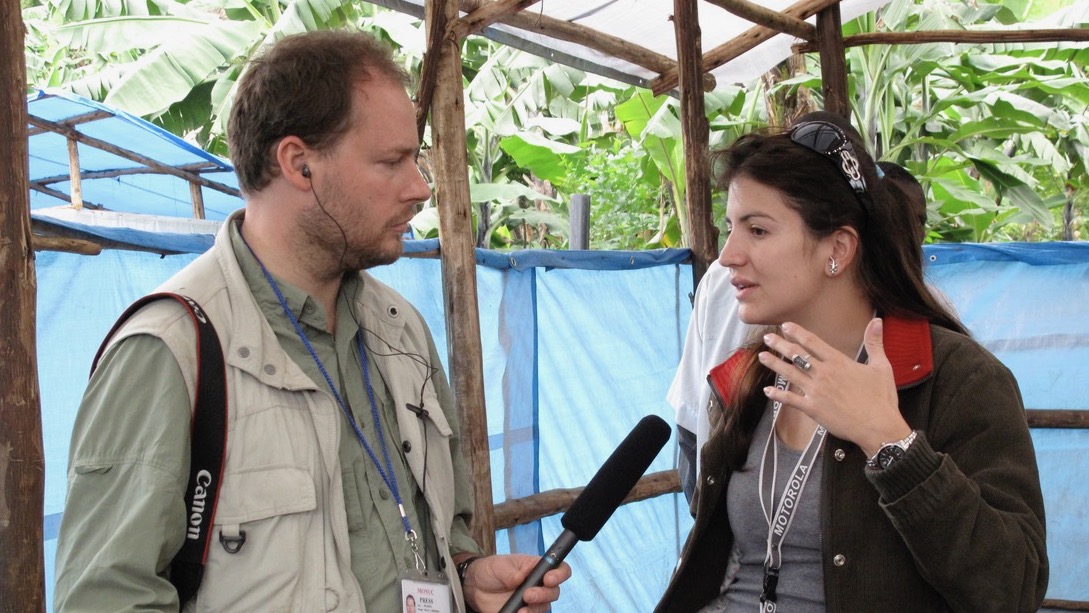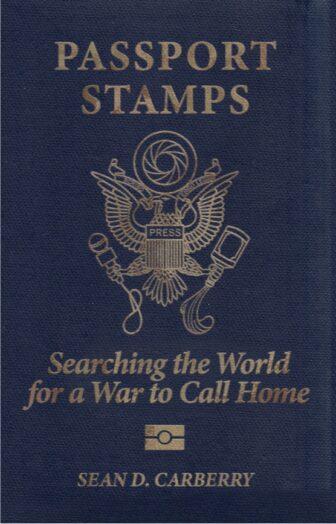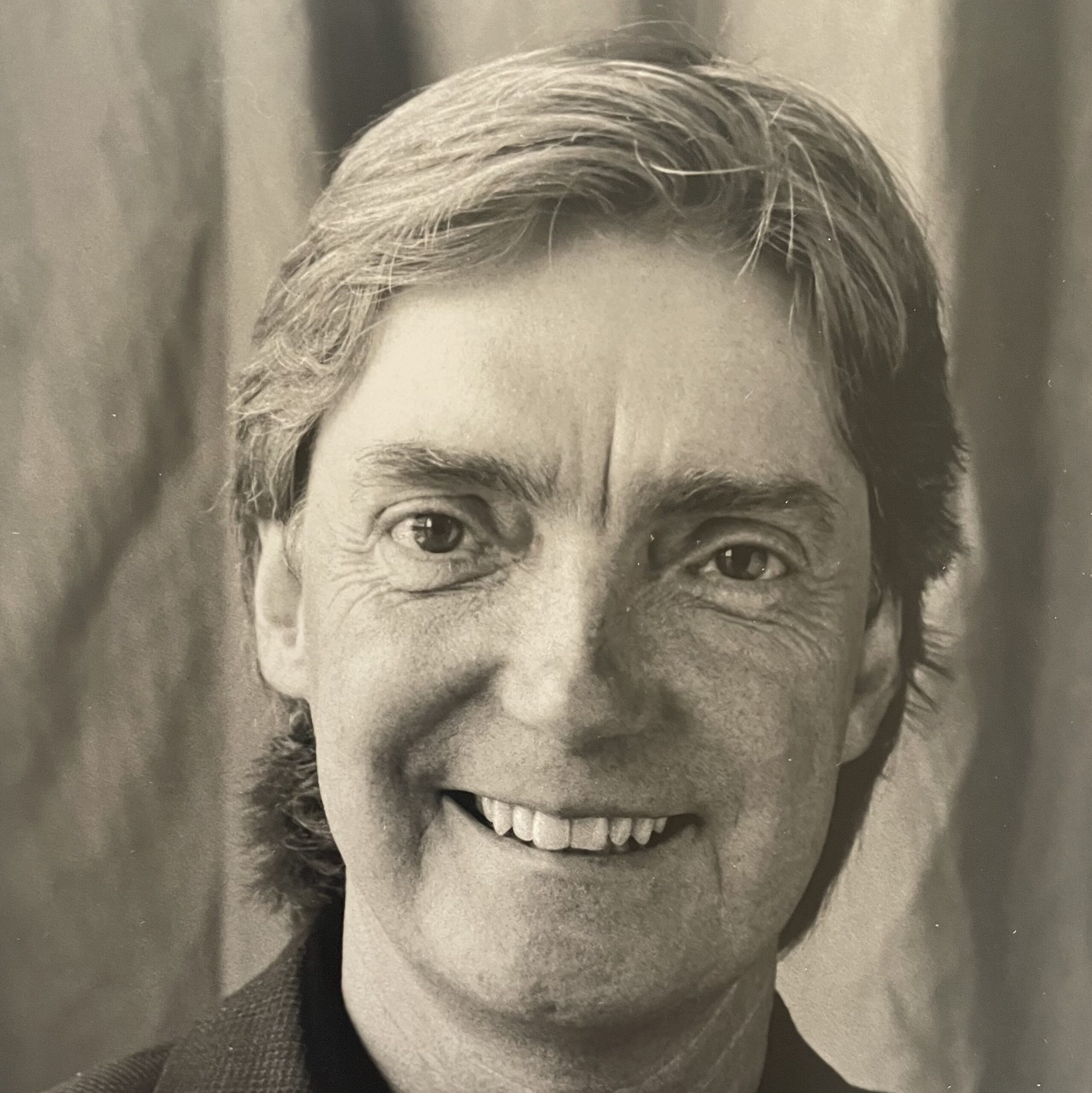His international reporting trips made Sean Carberry feel alive. Then came the aftermath.

Courtesy Sean Carberry
Sean Carberry interviews Lilla Schumicky-Logan, program coordinator with the African-Hungarian Union, in the village of Rutsiro in Congo, Feb. 14, 2009.
As an international correspondent for public radio, Sean Carberry learned firsthand about the emotional ups and downs that accompany parachuting into hostile environments. His reporting trips to Iraq, Libya, Sudan, Syria and other countries brought the thrill of adventure. They also left behind mental and emotional stress to process after Carberry’s assignments ended.

This journey is the focus of Carberry’s new book, Passport Stamps: Searching the World for a War to Call Home. In this excerpt, he looks back on a 2009 trip to Congo, where he reported on United Nations peacekeepers’ efforts to aid an embattled region.
The next day I took a road trip to Rutshuru, a village about 50 miles north of Goma. The drive was stunning. The landscape was a wide expanse of thick green vegetation with tree-covered mountains popping up here and there. Some of the mountains were completely covered and consumed by thick, soft clouds. It was Gorillas in the Mist territory. We passed a few small villages and some people walking along the road, which was paved about two-thirds of the way to Rutshuru.
We encountered a UN truck full of peacekeepers that had stopped to hand out some food to a group of children. The truck was heading our way, so we decided to follow in the interest of security. Bandits and militias were known to rob people along the road (two days after we drove that road, marauders stopped and robbed two Western video journalists in the middle of the day). Granted, I didn’t exactly feel that a truck of UN peacekeepers was really going to do much if shit went down, but I figured the truck would ward off the low-level thugs along the way.
As we passed by, children would wave to the UN truck and hold out their hands begging for goodies. Like in the camp, women were out doing chores or tending to crops, and there were few men to be seen. As we neared Rutshuru, the density of villages increased. The typical village was a cluster of primitive houses constructed of small branches covered with mud and topped with thick straw pyramids.
Our first stop was the MONUC (United Nations Organization Mission in the Democratic Republic of the Congo) compound in Rutshuru to meet with the Indian peacekeeping contingent. Giant coils of razor wire surrounded the small base. White tanks and armored transport trucks sat in one section of the compound and large, clean tent buildings covered the rest of the camp.
We met with the commanders of the force. We sat in a quaint covered patio in the center of the camp and discussed the conditions in the area over tea. I was struck by how it seemed to be a replica of a British camp in India during colonial rule. The posh Brits would be sitting for tea in a comfortable camp or base and discussing the savage and unkempt ways of their Indian subjects.
In the Congo, comparatively upper-crust Indians sat for tea and discussed the primitive ways of the Congolese. The peacekeepers were downright condescending when speaking about the locals. I found it offensive. They made remarks about how the people were uncivilized and violent. They talked down their noses about the lack of development, the inadequate governance and bureaucracy, and the inability of the country and the people to take care of themselves. While some of what they said was true, their tone and attitude was smug and arrogant. It just struck me as colonial transference.
After the briefing, I checked into my tiny room at the nearby church guest quarters. I had a 5-by-8-foot room with a mosquito net-covered twin bed, a wardrobe, a rickety chair, and a sink, which of course doubled as a urinal to save a trip outside to the bathroom — expeditionary living, folks.
After nightfall, I returned to the UN base to join the troops on a night patrol. I donned my dorky body armor. We started out by walking around downtown Rutshuru for a bit to show presence to the locals and “reassure” them that they were secure.
After that, we mounted up on a convoy of white Russian BMPs — infantry fighting vehicles. They basically looked like light-duty tanks and served as armored personnel carriers. The soldier in charge of the patrol instructed me to climb up and sit on top of one of the vehicles next to him. Unlike Mike Dukakis, I made sure there were no pictures of me looking like a doofus on the tank.
Once everyone was in or on a BMP, we moved out into the darkness. The BMPs rattled, buzzed, shook, farted, and spat. The engines sounded like a horde of overtaxed VW Beetles, and sparks and fire shot out of the exhaust. The mass of metal below me grew hotter and hotter and I became convinced it would burst into flames at any moment.
The convoy drove for about 20 minutes along dirt roads surrounded by thick vegetation. There was a partial moon that provided the only light. I could make out some trees and huts here and there. I could see the glowing caldera of a volcano off in the distance. We came to a stop and dismounted — in the middle of fucking nowhere.
The troops proceeded to march. We followed paths through jungle and palm trees in the faint moonlight. My eyes maxed out their night vision and I could see clearly 20 to 30 feet in each direction. The only manmade sounds in the area were our footsteps as we trudged through the jungle.
We came across some small huts. The leader of the patrol knocked on doors and announced that UN troops were patrolling and checking on security. He asked residents if everything was OK and if they had seen anything unusual or experienced any danger.
Timid voices responded from inside the wood and mud huts to say that they were fine.
It was a tad perverse. Lightly armed UN guys were roaming around the jungle in the dark and waking people up (and in some cases clearly scaring the shit out of them) to ask if they were safe and if they had seen any bad guys.
As we walked along, I couldn’t help but feel I was in some surreal outtake from Apocalypse Now or Tropic Thunder. I was half expecting to see a cameraman glide by on a giant crane. The partial moonlight, the palms trees, the huts, the troops furtively marching through the vegetation: it felt like at any moment artillery and tracers would crack off and we’d have to scramble for cover. Of course, deep down I was hoping for something like that to happen so I would have a more badass story.
We continued trekking through the jungle and knocking on huts and scaring people as the song “Roland the Headless Thompson Gunner” played in my head. At one hut, a man opened a wooden window shutter, and I could see his eyes and bits of his face. He told the troops that he had heard some noise a little earlier and looked out to see two or three young men roaming around. He didn’t know who they were and was afraid they were thieves. That was common there as armed men (sometimes government troops) would often roam through villages and steal anything they could.
The man indicated the direction that the men had gone, and we marched off in pursuit.
We marched for a while and emerged from the jungle onto a dirt road where other peacekeepers had already found the young men, questioned them, and sent them on their way. With that, we returned to our Russian death traps and rolled back to the base.
As we motored along, I stared off at the glowing red volcano in the distance and soaked in the moment. I was in the middle of the Congolese jungle, riding on a piece of shit Russian personnel carrier with Indian peacekeepers, staring off at simmering volcanoes in the dark of night after marching through remote villages and scaring the crap out of helpless people at the mercy of marauding militias and criminals. It was a moment. I was all there. I wasn’t pining for my ex. I wasn’t longing to be somewhere. I was there doing it. I was having an experience entirely my own. It was about as alive as I had ever felt. In that moment, I was in the Star Trek Nexus. I wanted it to last forever.
Alas, we arrived at the base and dismounted. I returned to my guest quarters, showered off the jungle sweat and diesel fumes, and crawled under the mosquito net.
The next morning, we drove farther north to Nyamalima, a village near the border with Uganda. There we joined with another peacekeeping unit on a patrol up a mountain to a remote village.
We hiked through dense jungle and emerged into an open expanse of rolling hills. We crossed a narrow river by walking across a tree-trunk bridge. We hiked uphill for an hour until a village appeared amidst the palm trees. The village was barely more than a dozen houses and a school building. Several dozen men, women, and children wandered about and gathered around the peacekeepers.
One man who looked about 50 explained that they had just returned to the village a few days prior. They had spent a week hiding in the bush. A handful of armed men came to the village, and the residents could not determine whether they were government soldiers or members of one of the many militias or rebel groups, so they fled into the jungle with nothing more than the clothes they wore. They said that the armed men had set up a small camp farther up the hill. After a few days, they left, and the villagers felt it was safe to return.
As the man told this story, his facial expressions and body language conveyed intense fear and helplessness. He explained that the villagers often ran off into the jungle to hide when any stranger came through the village. The locals had no weapons other than a few machetes. There was no government presence, no services, no electricity or running water. They were surviving, and that was it.
I kept focusing on the man’s demeanor. I couldn’t think of another time when I had seen a grown man seem so afraid and vulnerable. In Afghanistan or Iraq or other places I had been, I had encountered many people who were living in dangerous conditions. The men all seemed to convey some sense of resilience, toughness, or defiance — they came across as “manly” to some degree, whether it was bluster or not.
The Congolese man was traumatized and made no effort whatsoever to act tough or like he could handle the situation. That has stuck with me to this day. It was the first time I had seen a grown man who presented like a scared and beaten dog who would pick up his children and run at the slightest hint of danger.
Seeing the people in that village brought into focus something I had been starting to clue into in my travels to rough neighborhoods — the psychological impact of sustained danger and trauma. The people there had lived through brutal civil war and then waves of violence from the predatory militias that had been marauding eastern Congo for years. There was no state presence, no security force (that they could trust) where they lived. Their lives were not too far evolved from cavemen in the sense that they lived in the wilderness in primitive shelters and faced constant danger from violent predators — it’s just that in their case the predators were humans rather than jungle cats (although there were probably dangerous animals around too).
Those villagers lived under constant existential threat. Similarly, people I had encountered in rural Afghanistan had endured decades of war and violence. That shit eats away at you. You can’t endure that kind of constant trauma or threat of trauma without it affecting you.
I was lucky in that I was visiting dangerous places for weeks at a time and could leave for peace and comfort (although I was probably more likely to get shot in D.C. than in some of the places I was traveling to). Still, I was changing from my cumulative time in places like Iraq, Afghanistan, and the Congo. It was dialing up my idle, making me hyper-vigilant. I was constantly scanning for danger and paying much more attention to my surroundings.
Loud noises or people moving quickly around me would make me jump. I felt it getting more difficult to relate to people at home who had not experienced danger. Even though I had not been in a firefight or seen any of the action I had been seeking, spending weeks at a time in settings where violence and danger was possible, if not probable, was altering my brain chemistry.
So, while the fear and helplessness the man exuded was palpable, it didn’t surprise me. I could understand where it came from and how it could accumulate to the level it had in him. It sure as shit wasn’t a healthy way to live.






